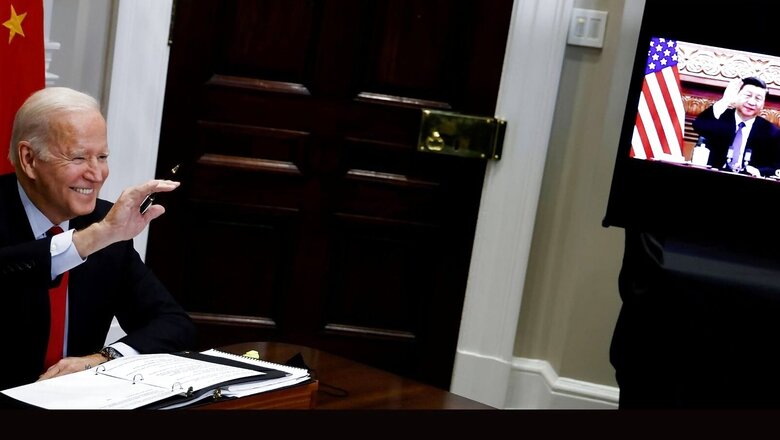
views
As Russia’s offensive into Ukraine continues, fragile diplomacy around the world is up for a test, and a clearer picture is yet to evolve. In contrasting, yet complementary coins of this conflict, tragic scenes unfolded in Mariupol as officials sought to rescue reportedly hundreds of people who are feared trapped in a theatre shelled by Russian forces. And at the same time, in a stage set with ‘cold’ tensions, the US and China held talks in what can be seen as a careful assessment on the road ahead for both sides amid the emerging situation.
The eagle fears that the dragon may help escalate the war in Ukraine, by providing additional ‘material’ resources. US President Joe Biden ‘warned’ his Chinese counterpart Xi Jinping in talks held on Friday of ‘consequences’ if Beijing gave material support to Russia’s invasion of Ukraine. While the White House did not detail what those consequences could be, or how the US would define “material support”, press secretary Jen Psaki indicated China’s massive trade flows could be impacted. And though China called for an end to the war ‘as soon as possible’, it did not assign blame to Russia for the invasion.
According to reports, ‘China is expressing some openness to providing Russia with requested military and financial assistance as part of its war on Ukraine’, as per information received by the US. CNN cited a Western official and a US diplomat in its report on the issue, adding that the US is conveying what it knows to its NATO allies.
But is the situation as simple as indicated by the talks? A deeper look tells the tale of calculated efforts as both nations stand to minimise the economic losses from the current situation. News18 explains
Assessing Xi’s Intentions
The call came at a critical juncture in US-China relations and in Ukraine, where heavily outnumbered local forces have so far prevented Moscow from seizing any of the country’s major cities. The Biden administration has warned Beijing, both publicly and privately, that providing material support to Russian President Vladimir Putin’s war would have dire consequences.
US Secretary of State Antony Blinken said China had a responsibility to use its influence with Putin and to defend international rules, but that it appeared Beijing was “moving in the opposite direction.”
“We’re concerned that they’re considering directly assisting Russia with military equipment to use in Ukraine,” he said, officially confirming for the first time reports earlier in the week that US officials believed China had signaled its willingness to provide Moscow with such support.
Blinken did not elaborate on the costs to China, and Washington has yet to provide evidence that China has signalled a willingness to assist Russia. Moscow has denied requesting military assistance from China, and China’s foreign ministry has dismissed the notion as “disinformation.” Western countries have sent military and humanitarian aid to Ukraine.
The call, according to White House press secretary Jen Psaki, is “an opportunity for President Biden to assess where President Xi stands.” “The fact that China has not denounced what Russia is doing, the absence of Chinese denunciation of what Russia is doing speaks volumes,” Psaki said.
US is More Dependent on China Than is Let On
While the US’ call for ‘consequences’ may sound threatening, at a deeper look it becomes clear that it will neither be easy, nor fruitful for the country to initiate major economic sanctions against China, or try to affect China’s trade with Russia. China does not support Russia’s war, but it also maintains normal trade relations with Russia, and Sino-Russian trade is likely to increase sharply, not only by absorbing large amounts of Russian oil, gas, and wheat imports, but also by significantly increasing exports of consumer goods and industrial technology to Russia to compensate for Russia’s trade relations with the West, according to a report by Asia Times.
When the US has made public threats against China, it does not need to circumvent sanctions. These are only sanctions based on US domestic law, not sanctions imposed by the United Nations Security Council. Goods transportation between Russia and China does not have to go through other countries, or only friendly countries.
American consumers are already reeling from first salvo in the US-China trade war which was fired on July 6, 2018, when the US imposed an additional 25% tariff on the first $34 billion in Chinese exports to the US.
The trade war was supposed to be a rebalancing of imports and exports between China and the US, with increased exports to China and decreased imports from China, rather than a decrease in both. However, Trump imposed three rounds of tariffs, which did not help to rebalance imports and exports, and the US deficit has instead grown larger, with the tariff burden borne primarily by American consumers.
Experts, including the US Chamber of Commerce, warn that US decoupling from China will disrupt existing supply chains, exacerbate production delays, and force companies and consumers to pay more—not least because relocating production will take time, according to a report by Foreign Policy. Biden is already bombarded with urgent requests from American businesses to repeal Trump-era tariffs. Furthermore, if Schumer’s bill becomes law, China has already threatened to reduce imports from the United States, potentially harming American farmers and energy producers, the report states.
China Is Also Keeping Its Head Down
According to reports, Xi will be mindful of the economic risks posed by secondary sanctions in the case of such a move, especially as the Communist Party’s 20th National Congress in Beijing this fall is widely expected to give Xi a historic third term in power.
A CNN report states that the trade between the European Union and China exceeded $800 billion last year, and trade between the United States and China exceeded $750 billion, while trade with Russia was just under $150 billion.
But the US is still worried and is debating what steps to take against China if it decides to assist Russia. But other reports suggest China is attempting to strike “a delicate balance” between rhetorically supporting Russia and further antagonising the US.
While Beijing and Moscow both have a strategic interest in confronting the West, Chinese banks, on the other hand, do not want to lose access to US dollars, and many Chinese industries don’t want to risk losing access to US technology, CNN reports.
“China’s leaders are walking a very difficult tightrope on Ukraine,” Craig Singleton, senior China fellow at the Foundation for the Defense of Democracies, a DC-based think tank told CNN.
Beijing has been slow to assist Russia after the country’s economy was slammed by sanctions from all over the world, the report analysed. Guo Shuqing, chairman of the China Banking and Insurance Regulatory Commission, stated on Wednesday that the country will not participate in sanctions, but he also did not offer any relief.
China is Important for Russia, But the Same (for Trade) May not Apply
Another report by the CNN details how China is ‘quietly making life difficult for China’ amid the conflict.
“While China is Russia’s most important trading partner, the Chinese government has other priorities. Trade between the two countries accounted for only 2% of China’s total trade volume. According to Chinese customs statistics from last year, the European Union and the United States have much larger shares,” it explains.
It further goes on to detail how China has let the ruble drop by doubling the size of the ruble’s trading range last week, allowing the Russian currency to fall faster.
The report also details how China is sitting on $90 billion in yuan reserves held by Moscow. Sanctions have frozen approximately $315 billion in Russian reserves, or roughly half of the total, as Western countries have prohibited dealing with Russia’s central bank. According to Russia’s state media, Russia’s finance minister, Anton Siluanov, stated this week that the country wanted to use yuan reserves after being denied access to US dollars and euros. So far, the PBOC has not commented on its position on these reserves, the report said.
Following the invasion of Ukraine, the World Bank has halted all of its programmes in Russia and Belarus. It had not approved new loans or investments for Russia since 2014, and none for Belarus since 2020. The Asian Infrastructure Investment Bank has also done the same. It announced earlier this month that it would suspend all activities related to Russia and Belarus “as the war in Ukraine unfolds.” The move was made “in the best interests of the bank,” according to the statement.
Read the Latest News and Breaking News here




















Comments
0 comment